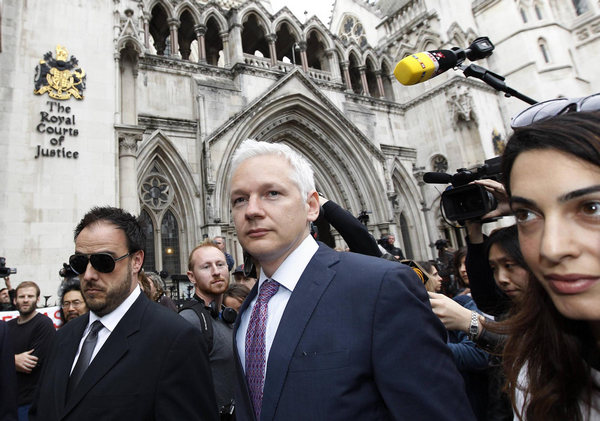WikiLeaks Julian Assange fights extradition
Updated: 2011-07-14 10:01
(Agencies)
|
|||||||||||
|
 WikiLeaks founder Julian Assange leaves the High Court in London July 13, 2011. Two judges deferred a decision on Wednesday over whether to allow WikiLeaks' founder Julian Assange to be extradited to Sweden from Britain over allegations of sexual misconduct. A written judgment will be handed down at a later date, as yet unspecified.[Photo/Agencies] |
LONDON - Lawyers for Julian Assange on Wednesday focused their fight against the WikiLeaks chief's extradition to Sweden on technicalities, trying to punch holes through the warrant seeking his arrest.
Assange is wanted in Sweden for questioning on allegations of rape and molestation, a prosecution he and his supporters claim is being manipulated to political ends , possibly with an eye toward sending him to the United States, where he's being investigated by a grand jury.
But there was no talk of conspiracy at the appeal hearings held at the Royal Courts of Justice in London, where Assange is seeking to overturn a judgment ordering him to Sweden. On February 24, a British District Court judge sided with Swedish prosecutors, saying there is no reason to believe Assange wouldn't receive a fair trial in Sweden.
Assange's new legal team attacked the arrest warrant's integrity on the final day of a two-day hearing, saying that the allegations against the WikiLeaks founder weren't backed by his accusers' testimony, that it was improperly issued, and in any case couldn't be carried out because it wasn't clear Assange would be brought to trial.
The two judges said they would give their ruling at a later date, likely within a few weeks.
Assange, in spectacles and a close-cropped platinum hair cut, watched from the second row of the wood-pannelled courtroom.
Gone was the grandstanding. The 40-year-old Australian entered the neo-gothic court without speaking to the media. In court, his lawyers steered clear of inflammatory arguments and took care to express their sensitivity for the alleged victims.
But they did argue that Assange's accusers , a pair of women that he had separate flings with in Sweden last summer , weren't making what could be recognized as allegations of nonconsensual sex under English law. That's important. If the Swedish allegations don't find a legal parallel in England, Assange can't be extradited.
Lawyer Ben Emmerson said Tuesday that while the women may have found Assange's sexual conduct distressing, it was "entirely consensual."
Addressing the most serious allegation , that Assange had unprotected sex with a woman while she slept , Emmerson argued that she had intercourse with Assange only hours before and in any case did not seem bothered, quoting testimony stating that "she let him continue."
The argument was attacked by Clare Montgomery, the lawyer for the Swedish prosecution, who on Wednesday accused Emmerson of "effectively winding the law on consent back to the 19th century."
"At best, the words 'I let him,' amounts to submission, not free consent," she said.
The lawyers also sparred over whether Swedish prosecutors were allowed to issue European arrest warrants or whether the Swedish case had moved far enough to justify an extradition request: Assange has yet to be charged.
Assange denies any wrongdoing in the case, which has cast a shadow over his future and that of his website, responsible for a series of spectacular leaks of US military, intelligence and diplomatic material.
If Assange loses his appeal, he's promised to take his fight to UK Supreme Court.
Assange remains on bail arrest at a wealthy supporter's mansion in eastern England. He has complained over his strict bail conditions, which include an overnight curfew and the requirement that he wears and electronic tag and reports to police daily.